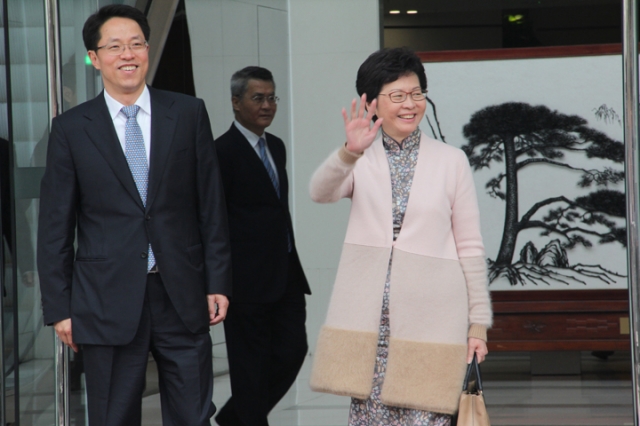See previous: Carrie Lam and the Civil Service Part II: Undermining the system?
“I knew administrative officers who said they’ve always joked that the best way to work with Carrie Lam is to not do anything, because no matter what proposal you give her, she will have already done another proposal herself.”
“No matter what your proposal is like, she will ask you to use her own, and scold you if you do not follow it.”
This was the opinion of Boris, a civil servant who worked directly under Hong Kong’s chief executive-elect for several years.

Michael, a 25-year-old administrative officer, likewise told HKFP that Lam was a stressful person to work with. “She often sends emails at 3am or 4am giving people tasks.”
Both told HKFP that allegations Lam had an “authoritarian” reputation during her time in government were not unfounded.
The week before the election, a political column in local paper Ming Pao claimed that Elizabeth Tse, the permanent secretary for financial services and the treasury, had once been reprimanded by Lam to the point of tears. Former lawmaker Emily Lau also warned of an exodus of administrative officers – the elite cohort of government policy-makers – if Lam came to power.
These comments came as an open letter apparently penned by a high-ranking civil servant was published by local paper Apple Daily. It alleged that Lam often ignored the advice of her subordinates, and did not trust them with responsibilities.
Lam’s office responded that the allegations were “groundless fabrications,” while Tse also dismissed the claims, saying that she had no plans to resign.
In a conservative society where corporal punishment and military-style training are not uncommon, similar complaints of clashing workstyles are heard across Hong Kong in both the public and the private sectors.

Experiences in the civil service differ mostly by chance. Michael said some of his colleagues had been reprimanded by superiors who “bash the table and throw objects.” However, retired veteran civil servant Kwok claimed that his generation was “well-versed in management theory, and most senior officials have a better attitude… they criticise people more indirectly.”
See also: Election 2017: Carrie Lam’s team says accusations over ‘control freak’ working style are groundless
Social tension between older and younger generations of Hongkongers are also reflected in the civil service. “The ones who joined before 1997 are a bit out-of-touch with reality since they have too many benefits,” said Amanda, a young officer in the department of justice. “They get over 30 days of annual leave per year… they get long service payments whereas we just have the mandatory provident fund, and they get accommodation quicker.”
“This kind of welfare was originally introduced to benefit British officials.”
Kwok agrees that the civil service has become a less attractive career option for young officials, despite job security and a higher entry salary compared to the private sector.
However, he believed an exodus of civil servants in response to Lam’s administration to be unlikely: “People are just watching and waiting as to what will happen.”

“There is a layer of insulation between junior officials like us and senior ones,” added young civil servant Michael. “It’s so hard to get into [an administrative officer position], so very few would resign simply because they’re angry at the top official.”
***
Yet two incidents in the wake of Lam’s electoral victory suggest that her authority over the civil service might not necessarily translate into political power as chief executive.
On the morning of March 27 – the day after the election – nine pro-democracy activists received calls from the police, saying they would be charged with public nuisance for their roles in the Occupy protests that took place over two-and-a-half years earlier.
Lam, who pledged unity in her victory speech, claimed she had no prior knowledge of the arrests. Some in the pro-democracy camp believed her. One of those arrested, Lee Wing-tat, went as far as to say that the incumbent government was playing a “prank” on her.
Then on March 29, Lam told Commercial Radio that she wanted to discuss the possibility of halting the high-stress Basic Competency Assessment tests for primary three students. Less than an hour after the radio interview, incumbent leader Leung Chun-ying told reporters that his administration would press on with the tests. Lawmaker Michael Tien said that Leung was asserting his authority.

“I think what would be worrying is her over-confidence in her own decisions and judgement,” said Boris, after reflecting on his time serving chief secretary Lam.
Boris observed that chief executive Leung had given Lam quite a free rein in policies such as poverty alleviation, retirement protection and even the Hong Kong Palace Museum deal. “These are all what we call ‘her babies’ – projects that she took a very active role in during both the incubation and execution stages.”
“A lot of the times she was right, she is indeed a very smart and experienced official,” said Boris. “So she has very little trust in her team and would keep everything she cares [about] within her grasp.”
“Not only does this make some of her decisions out of touch with reality… This discord she established with her team creates a vicious circle. She is unwilling to trust her people; her people are unwilling to give her their 100 per cent to avoid criticism.”
“Sooner or later, too much power will be concentrated in her hands, partly willingly given to her by civil servants… [which is] different from the case of [incumbent chief executive] Leung, who actively took power away from others.”
So what happens when Lam encounters a force too powerful to be harnessed by even herself?

As chief secretary, Lam is accountable to chief executive Leung. As chief executive, Lam will be accountable to the Central People’s Government, in accordance with the Basic Law – Hong Kong’s mini-constitution.
In recent years, the pro-democracy camp has decried an increase in Beijing’s interference in Hong Kong’s internal affairs, perceived to be conducted in collusion with Leung.
Last October, Leung and the secretary for justice filed an unprecedented legal challenge asking the High Court to disqualify two pro-independence legislators based on their failure to take their oaths of office. On November 7, Beijing’s legislature handed down an interpretation of Hong Kong’s Basic Law specifying exactly how oaths should be taken. The following week, the legislators were disqualified.
See also: LegCo oath-taking row
“I think Lam is less likely to be as influenced by Chinese officials as Leung was, because she was a career civil servant and should have ‘owed’ them less in her rise to power,” said Boris.
“You may say they’ve done a lot for her in the election, but I would not think this was requested by Lam.” During Lam’s campaign, numerous political figures claimed that Beijing actively supported her, while some electors alleged they received telephone calls and other types of pressure to vote for her.
“But what if she one day decides that she needs to curry favour with the Chinese – perhaps for her re-election – and starts using some of these powers [within the government] that she accumulated along the way?”

“[This question] may come up some time later when her administration becomes too weak and she needs ‘external’ support to maintain her place.”
***
Within Hong Kong’s Civil Service Code are a set of six core values, among them commitment to the rule of law and political neutrality – the latter defined as loyalty to the chief executive and the government irrespective of one’s political beliefs.
There may be a brewing conflict between the two values. Online outlet Stand News cited an example from last August, when election officer Cora Ho barred localist Edward Leung from running for the Legislative Council, saying she did not believe that Leung had genuinely abandoned his unconstitutional pro-independence beliefs.
Legal scholar Eric Cheung expressed concern: “The law has never given returning officers the power to make a political decision and give subjective judgement.”
Amanda, from the Department of Justice, expressed mixed views as to whether her department could maintain a balance between the two values in the future. “There’s a specific team that works with public order events, politically sensitive events. They will not share sensitive information with other colleagues,” she told HKFP.
“But if they really were biased, then they wouldn’t have prosecuted the seven police officers [convicted of assaulting activist Ken Tsang], they wouldn’t have prosecuted Donald Tsang [for misconduct as leader].”

For her part, Carrie Lam said in her victory speech last month that she would safeguard the city’s core values – explicitly mentioning the rule of law, the independence of the judiciary, and a clean government. She added that she would be brave enough to speak up on behalf of Hongkongers towards the central government, as long as what she said was good for Hong Kong.
“So let’s give Carrie Lam the benefit of the doubt,” said Amanda. “Let’s see what she’s like. Let’s see if she’s better than Leung Chun-ying.”
The names of sources in this series have been changed to preserve their anonymity, out of concern for their employment.
